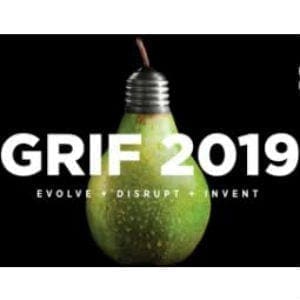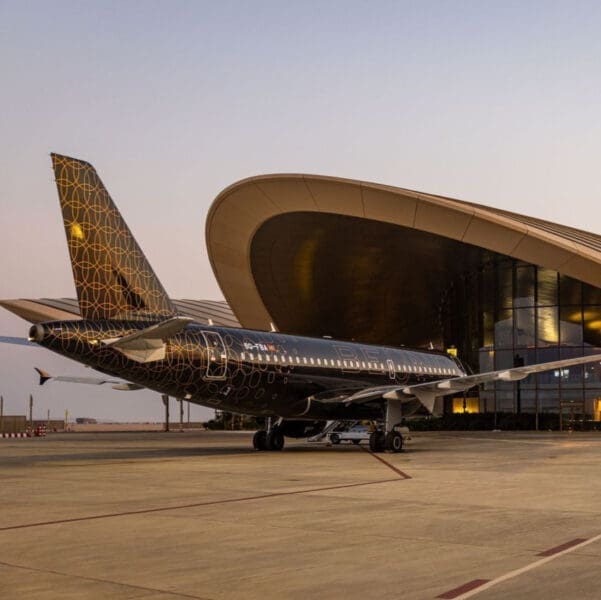 Hosted by NH Hotel Group at the NH Collection Grand Hotel Krasnapolsky in Amsterdam, The Global Restaurant Investment Forum (GRIF) will bring together more than 350 investors, owners, franchisors and hospitality leaders from February 25 – 27, 2019.
Hosted by NH Hotel Group at the NH Collection Grand Hotel Krasnapolsky in Amsterdam, The Global Restaurant Investment Forum (GRIF) will bring together more than 350 investors, owners, franchisors and hospitality leaders from February 25 – 27, 2019.
“With a focus on evolution, disruption and invention, the programme has a stellar line-up of speakers that will give delegates the critical insights they need to help drive business – to evolve, invent, and disrupt their ways through the current climate”, says Jennifer Pettinger-Haines, Co-Founder, GRIF and Managing Director – Middle East, Bench Events.
“We expect much of the debate at GRIF to be underpinned by the theme of sustainability and the importance of ‘profit with purpose’. This is why we have invited industry legend Raymond Blanc, Chef Patron at Belmond Le Manoir aux Quat’Saisons and Founder of The Raymond Blanc Consultancy, to deliver a one on one keynote interview focusing on his work as the President of the Sustainable Restaurant Association (SRA),” Pettinger-Haines added.
Chef Raymond Blanc, OBE and Legion d’honneur, is probably the most celebrated chef in Great Britain. Ahead of his keynote session at GRIF 2019, he discusses why sustainability is at the core of his business.
The Sustainability Revolution – by Harry McKinley Chef Raymond Blanc, OBE, may describe his character as “150% French”, but it’s in the UK that his culinary vision has been most widely realised. His Brasserie Blanc group – specialising in homely French cuisine – is a mainstay of affluent towns throughout the country, with a further six locations in the capital.
His two Michelin star Oxfordshire restaurant and hotel, Le Manoir Aux Quat’Saisons, is one of Britain’s most highly regarded. To the Great British public he’s often viewed as the face of French cooking, thanks in no small part to his frequent television appearances and a dozen successful books, based on his straightforward philosophy. It’s from this undoubtedly privileged position that Blanc champions one of the industry’s most increasingly relevant issues, sustainability.
“I believe sustainability is going to play a bigger role than ever before,” he says. “It forces us to ask the questions, what is modern luxury? What is modern food? What does the modern consumer want and how do we create a sustainable business that will work in the future?”
In 2012 Blanc became president of the Sustainable Restaurant Association (SRA), but it was his mother, the formidable ‘Maman Blanc’, who was the first to teach him the simple edict, “You shall waste not!”
He was among the first to adopt environmentally sound principles in his restaurants, understanding keenly the role sustainability can play in shaping operations, as well as the challenges faced by hospitality when it comes to adapting to changing times.
Le Manoir has 12 gardens, all organic or bio-dynamic, and each influenced by Blanc’s own culture, travels, people he has met and, most importantly, his “Papa and Maman.” Although eclectic, together he describes them as, “the perfect ensemble.”
Indeed, Le Manoir was embodying the ‘garden-to-plate’ concept before it was fashionable. “For six months of the year, much of our produce, around 60%, comes from our gardens,” he explains. “I’m proud that Le Manoir still achieves the highest level of excellence, and has delivered extraordinary experiences, for the past 35 years. This success has never been based on fashion but in mixing strongly rooted traditions with modernity and constant reinvention. But most of all, our success is based on thinking about luxury in an inclusive and responsible way.”
Equally, Le Manoir was one of the first hotels to remove most plastics and replace these with sustainable fibres. Within the kitchen, it was one of the first to create ‘specification sheets’ on each ingredient served in the restaurant, defining its provenance, and ultimately Le Manoir was the first to create a working 2-acre kitchen garden, providing over 150 varieties of organic vegetables for the restaurant. Its emphasis on seasonality is not mere lip service to a hot topic, but a vital component of its business model.
Of course, Le Manoir is not every restaurant, but Blanc is quick to bat away the notion that seasonality is solely the preserve of fine dining. “Although Brasserie Blanc is a high street restaurant chain, we have always embraced the same values as Le Manoir, using mostly the same suppliers,” he says. “Naturally the margins aren’t quite the same, but good quality, seasonal produce can translate into a workable model that also makes money; when under good management, of course.
“The biggest challenge that we face today is that we’ve been conditioned to want cheap, processed food and this has huge consequences on our industry and the health of the nation. But, there is a revolution happening. Today’s consumer is much more responsible and knowledgeable. They want to know where their food comes from and what is in it. Arguably, there is a greater realisation that we cannot go on subsidising food and agriculture, which means having to pay more for our food. For a long time, food was reduced to a mere commodity, where the value was cheapness, and that is perhaps the definition of unsustainable.”
There’s little doubt that consumer’s attitudes are, broadly speaking, one of the primary drivers of industry change, but more sweeping shifts in eating habits – such as a preference for health-conscious options – are also having an impact on sustainability at large. For Blanc, the rise of vegetarianism and veganism, for example, is not simply a passing trend but an example of a long-term transformation in how we think about food and what we choose to eat.
He notes, “The entire agriculture system contributes almost 30% to greenhouse gas emissions each year and this must change. The use of pesticides, fertilisers and germicides must be reduced on farms and more stringent laws be put in place. We also must choose the kind of protein we eat. For example, it takes 16,000L of water to make a kilogram of beef – this considering water will soon become a rarer commodity.
“Veganism is not a trend, but an important change based on knowledge and awareness that we – as chefs, consumers, home-cooks or restaurateurs – must embrace. It will define future agriculture and contributes to a better environment. It is also a wonderful opportunity for chefs and home-cooks to become more creative.
“Many years ago, I was the first to offer a whole à la carte menu for vegetarians, even though there was no market at the time. Loving vegetables was instinctive for me. Today, of course, it’s a way of dining that is here to stay, and which also happens to be sustainably minded.”
In terms of what is to come for the hospitality sector, Blanc calls the preoccupation with sustainability, “necessary, irreversible and exciting.” But as someone who has, from his first days as a restaurateur, sought to pass on his knowledge and create awareness, he understands better than most that a long journey still lays ahead. “You cannot have a revolution in a few days,” he says. “It’s going to take time.”
To hear more from Blanc on the sustainability revolution, and many more emerging topics, register now for GRIF and book your place at the annual meeting place for the global restaurant investment community.
The Evolution of Sustainability – Profit with Purpose
A one-on-one conversation with Raymond Blanc OBE
Wednesday 27 February, 14:00-14:30 https://www.grif.com/programme/day-three-wednesday-27-february
Young Disrupters Series
“It’s 2019. It’s no longer enough to create beautiful, high-quality products, to connect with your consumers. It’s time that businesses pay as much attention to their global environmental impact as to what they sell,” says Nathalie Streng, Founder of The Cold Pressed Juicery.
Nathalie Streng will be part of the Young Disruptors Series: Innovating to cater for the new wave of conscious consumption.
This series will feature a wave of innovators who are creating products to match consumers growing preferences and resulting industry needs.
Monique Borst – Consultant, Monique Borst Ltd
In conversation with:
Reinder Bakker – Owner, Overtreders W
Nathalie Streng – Founder The Cold Pressed Juicery
Find out more about how green businesses are good for people, for the earth and for the businesses themselves at GRIF in Amsterdam on Wednesday 27 February between 14:50-15:20.
#FAIRKITCHENS Movement
Globally, one in four chefs have experienced physical abuse. 74% of chefs report feeling sleep deprived to the point of exhaustion. More than half have suffered depression. It’s no wonder that 60% of young chefs feel little to no possibility of career progression.
Research by Unilever Food Solutions reveals a culture of daily deprivations – sleep, health, control – is having a serious impact on chef wellbeing which, in turn, means that the industry is losing talent. All of this points to a clear need for change. #FairKitchens is a movement to inspire a new kitchen culture. A culture where staff happiness is as important as diner satisfaction. Where a meal does not cost someone’s wellbeing.
Through creating solutions that enable restaurants and chains to adopt this way of working, the #FairKitchens movement is set to transform the industry and deliver more successful kitchens, with higher staff retention, increased diner loyalty and engaged guests who make a positive, conscious choice to eat there because they appreciate its values.
Join the #FairKitchens movement at the 2019 Global Restaurant Investment Forum and find out more about what you can do to contribute to the expertise and resources required to make the #FairKitchens vision a reality.
Ahead of the Global Restaurant Investment Forum, find out more at www.fairkitchens.com or follow @wearefairkitchens on Instagram.
Case Study Circl by ABN Amro: A Focus on Sustainability
Stef Driessen, Sector Banker Leisure, ABN AMRO Bank, will present a case study on the first day of GRIF, on how to successfully incorporate sustainable and circular principles into your business model, values and planning. He will also discuss why sustainability is becoming increasingly essential and how you can make it work financially.
Workshop time: Monday 25 February 10:00-11:30am


















